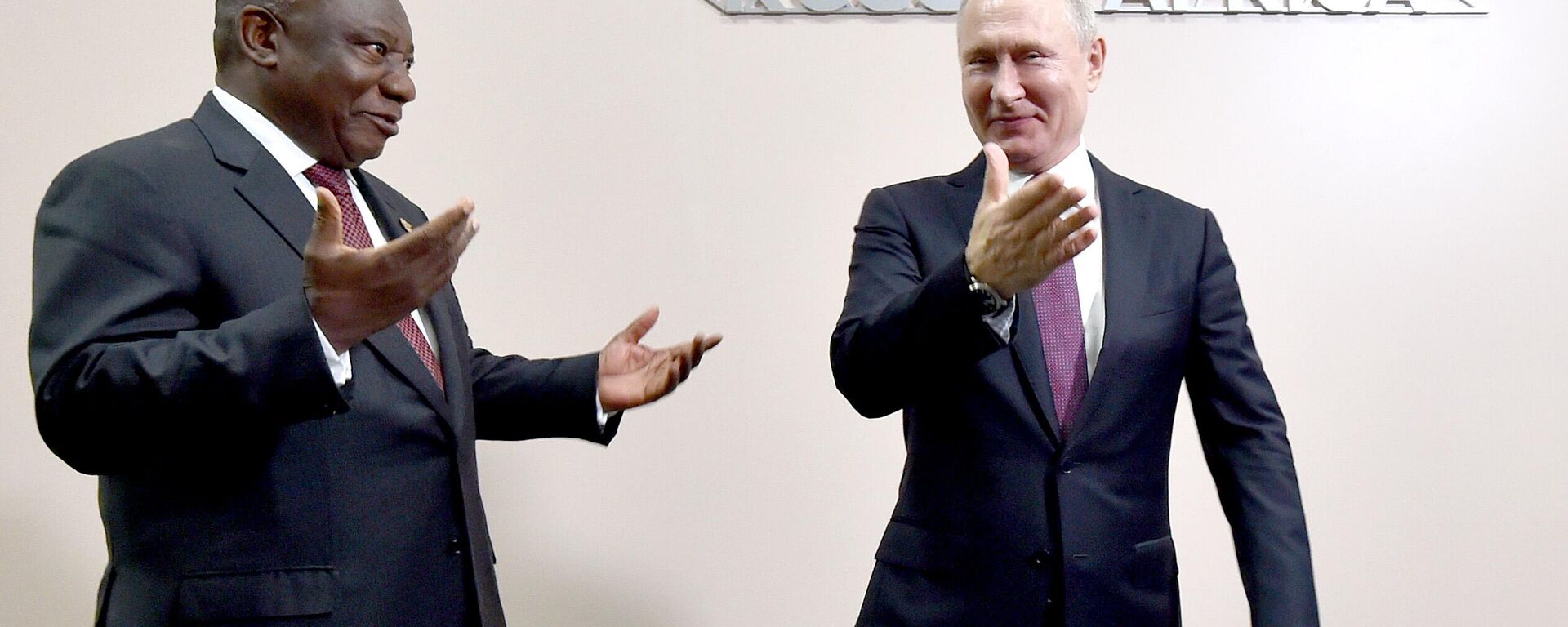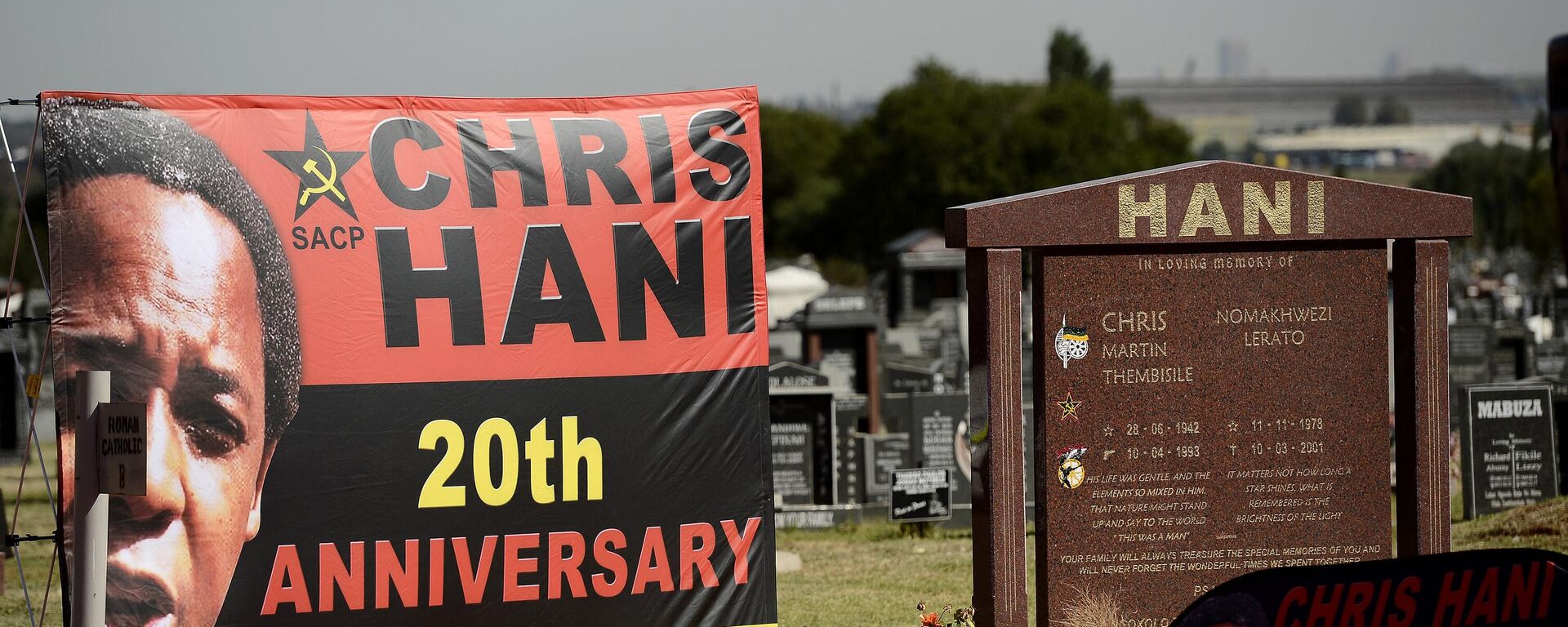https://en.sputniknews.africa/20230417/south-african-ex-president-zuma--thales-arms-deal-corruption-case-explained-1058663872.html
South African Ex-President Zuma & Thales' Arms Deal Corruption Case Explained
South African Ex-President Zuma & Thales' Arms Deal Corruption Case Explained
Sputnik Africa
In this article, Sputnik takes a look at each and every detail that you need to know about the ongoing arms deal corruption trial against former South African President Jacob Zuma and French defense company Thales.
2023-04-17T15:24+0200
2023-04-17T15:24+0200
2023-08-03T10:48+0200
southern africa
south africa
jacob zuma
france
court
arms supplies
thales
features
international
https://cdn1.img.sputniknews.africa/img/07e7/04/11/1058664152_0:0:2048:1153_1920x0_80_0_0_11a826102c4a1efcc8f966b8ececf893.jpg
On Monday, the Pietermaritzburg High Court in South Africa was set to resume the trial against the country’s former leader Jacob Zuma and French defense firm Thales. The charges include corruption, money laundering, tax evasion and racketeering in connection with a 30-billion-South-African-rand ($2.5 billion) defense procurement package that took place in 1999, when the Zuma was serving as South Africa's vice president.However, the court on Monday ordered a four-month postponement in the much-delayed trial of the former president.Sputnik takes a look at each and every detail that you need to know about the arms deal corruption trial against the former South African leader and the French company.Arms Deal & Corruption AllegationsThe arms deal under scrutiny was a significant defense procurement program in the late 1990s and early 2000s aimed at re-equipping the South African armed forces for the post-apartheid era. The program involved the purchase of military equipment such as corvettes, submarines, and fighter jets from various international defense companies, including Thales.There were critical opinions of opposition parties on the arms deal procurement. While the deal faced criticism from the outset regarding its expenses and overall strategy, most of the ensuing controversy focused on allegations of corruption and doubts about the fairness of procurement processes from the French company.The court case, which marked one of the longest and most complex legal battles in South Africa's history, focuses on claims of corruption that is alleged to have taken place during and after the arms procurement process.Prosecutors claim that French defense firm Thales, previously known as Thomson-CSF, allegedly paid Zuma 500,000 rand ($34,000) every year since 1999 as a bribe to then South African VP Zuma in order to ensure protection from an investigation into the military hardware supply deal to the country.Both Thales and 80-year-old Zuma, who later served as South Africa head of state from 2009 to 2018, deny the allegations.Ongoing Legal BattleThe corruption case related to the arms deal was first presented to the court in 2005, but it has been repeatedly postponed and has been mired in legal challenges and political controversy. Just a few weeks before Zuma became president in 2009, the National Prosecuting Authority (NPA) dropped the charges against him due to legal technicalities.Despite this, seven years later, during Zuma's presidency, the High Court declared that the decision taken in 2009 to drop the charges unreasonable and asked the NPA to review the case again. The South African Supreme Court of Appeal supported the ruling in 2017.In March 2018, the month after Zuma stepped down from the presidency, the National Prosecuting Authority officially refiled the charges against him. Since then, the case has been postponed several times for various reasons, including Zuma's defense team's petition to have state prosecutor Billy Downer removed from the case over claims of bias and leaking the ex-president's confidential medical information to the media.Zuma was sentenced to 15 months in prison in July 2021 after the Constitutional Court determined him guilty of contempt for not showing up before a judicial commission investigating the corruption allegations. The imprisonment resulted in violent protests and riots throughout the country. After two months, the former president was granted medical parole, but in December, a court reversed the parole, and he was forced to spend the rest of the sentence under home arrest.The trial in the arms deal case was last heard in January, when the judge that had been overseeing the case, Piet Koen, recused himself. The proceedings were then adjourned until April 17, with Judge Nkosinathi Chili taking over the proceedings.
https://en.sputniknews.africa/20230413/south-african-lawmaker-calls-on-pretoria-to-withdraw-from-icc-to-bypass-putins-arrest-warrant-1058574068.html
https://en.sputniknews.africa/20230413/patriotism--passion-against-exploitation-sacp-chief-on-chris-hanis-legacy-1058571213.html
southern africa
south africa
france
Sputnik Africa
feedback@sputniknews.com
+74956456601
MIA „Rossiya Segodnya“
2023
Muhammad Nooh Osman
https://cdn1.img.sputniknews.africa/img/07e7/04/0a/1058467512_0:0:1280:1280_100x100_80_0_0_ec723833bcbfcaed2e21952965ad99e4.jpg
Muhammad Nooh Osman
https://cdn1.img.sputniknews.africa/img/07e7/04/0a/1058467512_0:0:1280:1280_100x100_80_0_0_ec723833bcbfcaed2e21952965ad99e4.jpg
News
en_EN
Sputnik Africa
feedback@sputniknews.com
+74956456601
MIA „Rossiya Segodnya“
Sputnik Africa
feedback@sputniknews.com
+74956456601
MIA „Rossiya Segodnya“
Muhammad Nooh Osman
https://cdn1.img.sputniknews.africa/img/07e7/04/0a/1058467512_0:0:1280:1280_100x100_80_0_0_ec723833bcbfcaed2e21952965ad99e4.jpg
zuma thales legal case explained, president zuma, thales, south africa, court, zuma court, jacob zuma, why isn't zuma in jail? , what happened with zuma's court case? , south african arms deal, thompson-csf,
zuma thales legal case explained, president zuma, thales, south africa, court, zuma court, jacob zuma, why isn't zuma in jail? , what happened with zuma's court case? , south african arms deal, thompson-csf,
South African Ex-President Zuma & Thales' Arms Deal Corruption Case Explained
15:24 17.04.2023 (Updated: 10:48 03.08.2023) Muhammad Nooh Osman
Writer/Editor
Former South African President Jacob Zuma and French defense company Thales, previously known as Thomson-CSF, are jointly facing 18 charges related to corruption, money laundering, tax evasion, and racketeering. These charges stem from their involvement in a $2.5 billion arms deal that took place in 1999, when Zuma was serving as vice president.
On Monday, the Pietermaritzburg High Court in South Africa was set to resume the trial against the country’s former leader Jacob Zuma and French defense firm Thales. The charges include corruption, money laundering, tax evasion and racketeering in connection with a 30-billion-South-African-rand ($2.5 billion) defense procurement package that took place in 1999, when the Zuma was serving as South Africa's vice president.
However, the court on Monday
ordered a four-month postponement in the much-delayed trial of the former president.
"This matter is adjourned to August 15, 2023 for the hearing of Mr Zuma's second application for the removal of Mr [Billy] Downer [...] as state prosecutor in the criminal trial," Judge Nkosinathi Chili said.
Sputnik takes a look at each and every detail that you need to know about the arms deal corruption trial against the former South African leader and the French company.
Arms Deal & Corruption Allegations
The arms deal under scrutiny was a significant defense procurement program in the late 1990s and early 2000s aimed at re-equipping the South African armed forces for the post-apartheid era. The program involved the purchase of military equipment such as corvettes, submarines, and fighter jets from various international defense companies, including Thales.
There were
critical opinions of opposition parties on the arms deal procurement. While the deal faced criticism from the outset regarding its expenses and overall strategy, most of the ensuing controversy focused on allegations of corruption and doubts about the fairness of procurement processes from the French company.
The court case, which marked one of the longest and most complex legal battles in South Africa's history, focuses on claims of corruption that is alleged to have taken place during and after the arms procurement process.
Prosecutors claim that French defense firm Thales, previously known as Thomson-CSF, allegedly paid Zuma 500,000 rand ($34,000) every year since 1999 as a bribe to then South African VP Zuma in order to ensure protection from an investigation into the military hardware supply deal to the country.
Both Thales and 80-year-old Zuma, who later served as South Africa head of state from 2009 to 2018,
deny the allegations.
The corruption case related to the arms deal was first presented to the court in 2005, but it has been repeatedly postponed and has been mired in legal challenges and political controversy. Just a few weeks before Zuma became president in 2009, the National Prosecuting Authority (NPA) dropped the charges against him due to legal technicalities.
Despite this, seven years later, during Zuma's presidency, the High Court declared that the decision taken in 2009 to drop the charges unreasonable and asked the NPA to review the case again. The South African Supreme Court of Appeal supported the ruling in 2017.
In March 2018, the month after Zuma stepped down from the presidency, the National Prosecuting Authority officially refiled the charges against him. Since then, the case has been postponed several times for various reasons, including Zuma's defense team's petition to have state prosecutor Billy Downer removed from the case over claims of bias and leaking the ex-president's confidential medical information to the media.
Zuma was sentenced to 15 months in prison in July 2021 after the Constitutional Court determined him guilty of contempt for not showing up before a judicial commission investigating the corruption allegations. The imprisonment resulted in violent protests and riots throughout the country. After two months, the former president was granted medical parole, but in December, a
court reversed the parole, and he was forced to spend the rest of the sentence under home arrest.
The trial in the arms deal case was last heard in January, when the judge that had been overseeing the case, Piet Koen, recused himself. The proceedings were then adjourned until April 17, with Judge Nkosinathi Chili taking over the proceedings.




